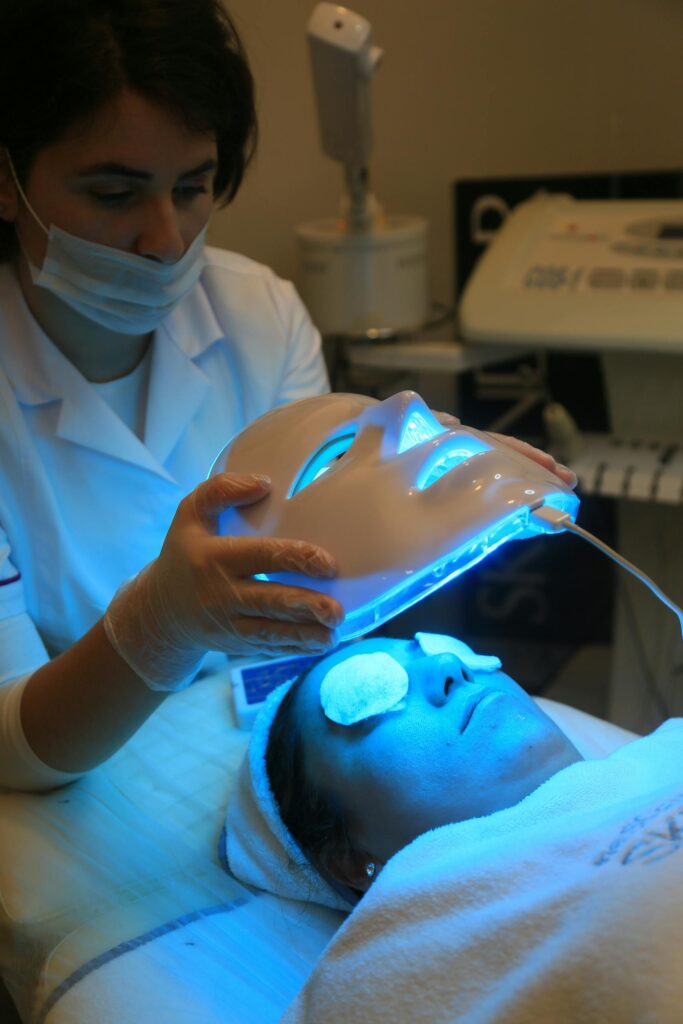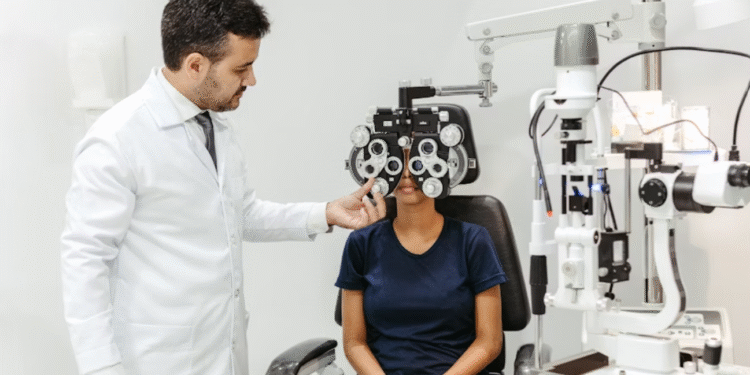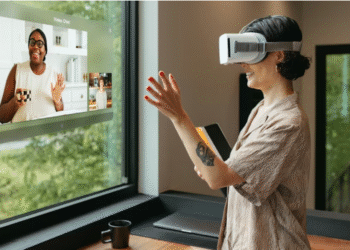We cannot avoid blue light in the digital society we live in today. Our exposure to blue light, sometimes called high-energy visual (HEV) light, has significantly grown due to many factors, including the glow from our smartphones and the amount of time we spend staring at these devices. Blue light affects our skin and is less well understood, although being frequently linked to eye strain and irregular sleep patterns.
Recent research indicates that extended exposure to blue light may cause hyperpigmentation, early ageing, and other skin issues. Fortunately, there are methods for protecting your skin against digital exposure, and many of them include natural therapies and easy lifestyle adjustments.
We’ll examine how blue light affects the skin in this post and offer practical self-defence techniques.

Blue Light: What Is It?
The visible light spectrum includes blue light, which has wavelengths between 400 and 500 nanometres. Both natural sources, like the sun, and man-made ones, including computers, smartphones, and LED lights, emit it.
Sunlight exposure offers advantages, but blue light from electronics presents special difficulties. Blue light can potentially influence not just the skin’s surface but also its underlying layers because it penetrates the skin more deeply than UV radiation.
Blue Light’s Impact on Your Skin
1. Early Ageing
Exposure to blue light speeds up the skin’s deterioration of collagen and elastin, two vital proteins that keep the skin elastic and firm. This can cause photoaging, which is the term for the development of fine lines, wrinkles, and sagging skin.
2. Excessive pigmentation
According to studies, blue light can activate melanocytes, which are cells that produce pigment, leading to an excess of melanin. Especially in those with darker skin tones, this can lead to hyperpigmentation, black patches, and uneven skin tone.
3. The Redness and Inflammation
Free radicals produced by blue light can lead to oxidative stress in the skin. This causes irritation, redness, and inflammation in addition to weakening the skin barrier.
4. Sensitivity of the Skin
Long-term exposure to blue light might increase your skin’s sensitivity to environmental aggressors like UV radiation and pollution. This may eventually result in a lifeless and worn-out appearance.
5. Impairment of the Skin Barrier Function
The skin’s natural barrier may be weakened by the oxidative stress brought on by blue light, which would reduce its ability to retain moisture and defend against dangerous chemicals. Dryness and heightened susceptibility to outside harm may result from this.
How to Guard Against Blue Light on Your Skin
There is no need for a total digital detox to protect your skin from blue light. Instead, to lessen its effects, you might include natural therapies and easy routines in your regimen.
1. Use Skincare Products with Blue Light Protection.
• Look for items that are designed to protect your skin from blue light. These frequently include antioxidants, which lessen oxidative stress and neutralise free radicals.
• Niacinamide, vitamin C, and astaxanthin are among the ingredients that are quite effective in preventing damage caused by blue light.
2. Use sunscreen every day.
Even though sunscreens are usually designed to block UV radiation, several contemporary formulations now also block blue light. Choose a sunscreen that blocks blue light physically, such as one that contains titanium dioxide or zinc oxide.
3. Set Screen Time Limits
One of the best strategies to reduce exposure to blue light is to spend less time in front of digital devices. Use the 20-20-20 rule to take regular breaks: spend 20 seconds staring at anything 20 feet away every 20 minutes.
4. Use a Blue Light Blocker
Make use of apps or screen protectors that lessen the amount of blue light your gadgets emit. Nowadays, a lot of laptops and smartphones have built-in blue light filter settings that may be turned on in dimly lit areas.
5. Consume a Diet High in Antioxidants
Taking care of your skin from the inside out is equally as vital as protecting it from the outside. Include foods that are high in antioxidants, like:
Blueberries, raspberries, and strawberries are examples of berries.
• Leafy greens, such as kale and spinach.
• Nuts and seeds: sunflower seeds, walnuts, and almonds.
• Vegetables with vibrant colours: bell peppers, sweet potatoes, and carrots.
These meals aid in the body’s defence against oxidative stress and the restoration of damage brought on by free radicals.
6. Hydrate Your Skin
To keep your skin’s barrier function intact, keep it well-hydrated. In your skincare products, look for moisturising components like ceramides, aloe vera, and hyaluronic acid.
7. Apply Masks and Natural Oils
Argan, rosehip, and jojoba oils are examples of natural oils that can serve as protective layers on your skin, lessening the effects of blue light. The skin can also be soothed and nourished by using DIY masks made with honey, turmeric, or yoghurt.
Natural Substances to Prevent Damage from Blue Light
When it comes to preserving and mending skin damaged by exposure to blue light, certain natural substances work very well:
• Green tea extract: Packed with antioxidants, it helps fight off free radicals and lessen inflammation.
• Curcumin, a strong antioxidant that combats oxidative stress, is found in turmeric.
• Aloe Vera: Promotes the skin’s natural healing processes and reduces inflammation.
• Vitamin E: Serves as a potent antioxidant and hydrating agent.
• Chamomile: Reduces sensitivity and redness brought on by extended exposure.
Include these elements in your skincare regimen or seek out products that highlight them.
Blue Light and Skincare at Night
The processes that heal and regenerate your skin are most active at night. Focus on a night-time skincare regimen that consists of the following to counteract blue light exposure:
• Double Cleaning: To allow your skin to breathe, remove all makeup and contaminants.
• Antioxidant Serums: To combat oxidative stress, use serums high in ferulic acid or vitamin C.
• Moisturiser: To repair your skin barrier, seal in moisture with a nutritious cream.
• Eye Cream: Preserve the sensitive skin surrounding your eyes, which is especially susceptible to harm from blue light.
The Future of Skincare with Blue Light
To address the growing worry about the effects of blue light on skin, the beauty industry is quickly coming up with new ideas. The future offers promising options for reducing digital exposure, such as moisturisers that block blue light and skincare products with tech integration.
Since they provide a more comprehensive approach to protection and healing, experts expect that skincare products that contain plant-based components and sophisticated antioxidants will grow in popularity.
Final Remarks
Although blue light is an inevitable aspect of modern life, you may control its effects on your skin by using the appropriate techniques. You can prevent damage and maintain a healthy, glowing complexion by using blue light-blocking skincare products, engaging in digital mindfulness exercises, and feeding your skin antioxidants.
In an increasingly digital world, protecting your skin from blue light is important for maintaining its health, not only for show. Your skin will appreciate the tiny adjustments you make today.















